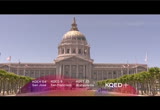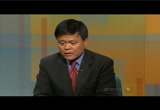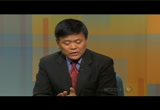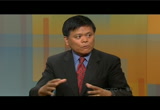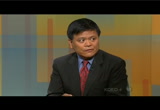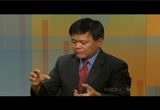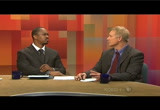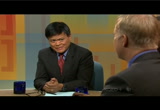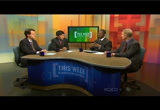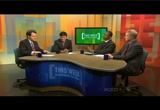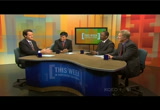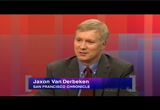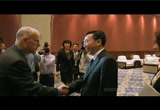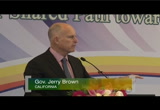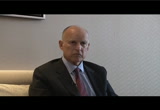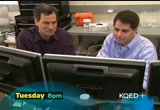tv This Week in Northern California PBS April 20, 2013 12:30am-1:00am PDT
12:30 am
two of california's leading industries have plenty at stake at immigration reform works its way through congress. >> the only way america loses is to do nothing. >> federal investigators call for stronger oversight of chevron in light of last year's massive fire at richmond refinery. governor jerry brown weighs the costs of overhauling the california environmental quality act. and john myers reports on the governor's hopes of partnering with china in the fight against climate change. >> it is not just commerce that is moving through china to the west, it is air pollution and greenhouse gasses. >> coming up next.
12:31 am
captioning by vitac, underwritten by fireman's fund good evening. i'm joshua johnson. welcome to "this week in northern california." the manhunt is over for a suspect accused of the attack on the boston marathon. police have arrested dzhokhar tsarnaev in a boston suburb. meanwhile, a boy from contra costa county is recovering from the bombing. a family of aaron hearn said he could be released from the hospital soon. there is plenty to discuss. joining us are paul rogers,
12:32 am
environmental writer for the san jose news. jaxon van derbeken, reporter for the san francisco chronicle. and emil guillermo, a blogger for the asian-american legal defense. welcome. immigration in congress is getting attention these days on the farms and the sill valley. both rely on immigrant work forces. the tech sectors biggest names launched a campaign called forward u.s. the ceos of facebook and zinga and others. emil, let's start with the key compromise of the bill. >> before we get to that, you mentioned agriculture workers, 400,000 in california that could benefit from this and the high tech workers.
12:33 am
doubled to 110,000. it can go up to 180,000. facebook, the high tech folks got what they wanted and all because of blogging. >> these are the visas to allow the highly skilled workers to remain in the u.s. >> they got what they wanted from the lobbying because, you know, it was reported how zuckerberg with the 501 c 3 and fear of a contingency of hiring americans that were stem workers or having equal pay for the workers they bring from abroad. none of that was there. they got everything they wanted. winners in california. this is a political compromise. this can blow up. we saw that this morning when the judiciary committee mentioned boston. linked boston to immigration reform. this could provide cover for people who do not want this to
12:34 am
go through. john mccain came out later this afternoon and said this is good that boston happened because we will have secure borders. that is the key to the compromise. look at the name of the bill. border security, economic opportunity and immigration modernization. the first two are the priorities. the last one, immigration, serve the first two. >> it sounds like the conversation today, in light of what happened in boston that the president spoke not long ago, part of the conversation had to do with the legacy issues and pathway to citizenship and securing the borders. the issues that are biggest for us in the bay area in california, agriculture and high tech, are more off the radar for congress and it is a good thing. >> the pathway is the first step. you have to get the compromise to get the right over to the middle and that was based on trying to make this thing tough and make it based on secure borders.
12:35 am
people on the left are moving to the middle. the best thing that happened to the left is the dream act gets passed. you have a quicker path to citizenship, five years, and you have dreamers who came in when they were young. now the people capped at 30 and now people 30 and up get to be part of the fast track. fast track is five years. the citizenship for everyone else could be up to 15 years. this is the key thing. if you were here before january 1st, 2012, you can apply and see if you passed all the background checks are okay for people here illegally. not people to do illegal things with guns. they want to make sure you didn't vote. pay taxes and you have a small fine and a six-year window that means you come out of the shadows. then, it extends. after the six years, you can, if everything is good, you can go to a four-year window.
12:36 am
after that ten years, it is all contingent on security triggers. there will be a 90% apprehension rate at the border. if it works, then you get a three-year pathway to citizenship. >> what's the political handicap in all this? to me the fascinating thing is when you look at the demographics of the country and the way they are changing -- in the 1980 president election, 90% of the people who voted for the president is white. it has fallen by 1% or 2% every year. how much of that of the electoral is driving the republicans particularly in the senate toward this and will it pass in the house? >> it is driving it totally. the only thing keeping them in the compromise is the fact this is a punitive thing. this is a 15-year plan at the longest. if you look at 1986 -- >> when bush tried this, they killed it. what is different?
12:37 am
>> in 1986 with reform, it was 19 months of temporary work and five years to pathway to citizenship. this is 15. this is punitive. the main point they want to make is this is not amnesty. as long as they say this is not amnesty and there are secure borders in the package, this has a chance to fly. if someone wants political cover and someone wants to use boston and what about immigrants, then this can. we mentioned the proposal. this is the new generation immigration plan. this is not my father's immigration plan. this is really all about the economic certainty of bringing in people and once they get through all these little steps, it becomes a merit system. it is like the usa becomes harvard usa and it is like applying to college.
12:38 am
if you have the goods -- the statue of liberty is out there. she is not shining a light on this pathway and give me your poor and tired and huddled masses. this is about -- she has her arms folded and show me what you got. this meritocrasy. asian-americans are vocal about what is going on in the bill. it cuts out the brother/sister preference. it cuts out older married children over 30. everything that brought together family unification. that used to be the core value of immigration policy. >> i know there are members of congress, especially congress member gutierrez of illinois. we will see how that shakes out in the months to come. it will be interesting to see how the tension between the need for the high skilled workers and
12:39 am
welcoming families in the country and how it plays out. at this hour, east bay residents are meeting in richmond to discuss the fire at the chevron refinery. the blast sent 15 people to local hospitals. a preliminary report accuses chevron of negligent and ignoring maintenance and patching up problems for more than a decade. jaxon van derbeken, what does the board want chevron to do? >> what do they want them to do? chevron has a huge job ahead of themselves in the future and as does the whole oil refining industry in california. based on the direction the chemical safety board which investigated this massive fire last august. they basically told everyone that they all have to start new when it comes to refinery inspections and safety and oversight. what they call a step increase. a massive increase. california has very little
12:40 am
oversight over refinery. they have seven inspectors for the highly hazardous operations in the state. they have spent very little time. average of 150 total hours on chevron in six years. it's very little time that they spend. one inspection, they did a paper review. there are all sorts of things. >> what does a paper review mean? >> they did not visit the refinery. in one inspection that was done after a refinery disaster in another state, california did a paper review to make sure the refineries in california were not at risk. that was intense inspection. it took less than a week and that was one of the three inspections that california did of chevron. on paper. >> this sounds amazing. you cannot renew your registration in california
12:41 am
without somebody watching your carro roll around on the cylinders. it sounds like what the u.s. chemical safety board is asking for is for actual human interactive inspections of the facilities. >> there has been some of that, but it is the case where is what they call patch work of agencies. with varying responsibilities and levels of staffing. daqmd has 75 people. the air quality management district. they enforce the air rules. they have 75 people to do just the seven counties in the agency. there have seven inspectors for the thousands of facilities in california. there are different levels of staffing and different levels of focus. they conflict. there is very little ko coordination. the chemical safety board said you have to start from scratch.
12:42 am
california should be a model for the industry across the united states. california was among the weakest. they used the federal rules and state results can be stronger. >> i guess for folks who don't know, why did it blow up and how much could chevron be on the hook for? >> why did it blow up? according to the chemical safety board, this refinery over a decade, the operators should have known higher sulfur in the ground as crude from alaska which is lower in sulfur which is diminishing other crude from other parts of the world. higher sulfur is coming to the plants. what happens is sulfur interacts with the iron and steel in the pipes and forms areas where the pipe literally wears away and
12:43 am
developing scale and all sorts of problems. this pipe corroded to less than a dime's thickness. 90% of the original thickness was gone. >> nobody inspected that? >> it wasn't inspected since 2002. chevron got a last-minute wake-up call in march of 2012. they did an audit to say they were adhering to their policies. this refinery was not checking for corrosion and did not do the changes needed to change corroded pipes. >> how much will it cost them? >> we know one thing right now that cal osha wants nearly $1 million in fines. that will probably be a drop in the bucket based on the civil liability given some 10,000 or so folks who live near and around the refinery are going to be seeking compensation. >> before we move on, chevron has been very active in terms of being out in the community in
12:44 am
richmond since this happened. they have been trying to be public and save face and donating to local organizations and getting involved in charities. how is that public relations battle going on with the residents of richmond and those neighborhoods and the area that is dealing with the refineries for a long time and chevron? >> chevron's wide scale public relations campaign before and after -- the people in richmond knows that chevron is the place that people hated. they tried to soften that. to which effect it is unclear. we hear about people who are unhappy. >> they devalued the people of that neighborhood? we know about environmental racism. are we seeing that at play? >> the consensus is chevron was there first. people moved there. nobody thinks moving there
12:45 am
should cost them their life. on the other hand, it is baked into property values. they do provide a lot of money to the city of richmond. they look at it from different perspectives. >> this is the draft interim report and the chemical board has a long way to go from here. governor jerry brown is making overtures of law that is a hot topic. the california environmental quality act requires developers to conduct environmental impact studies before they break ground. supporters are crediting urban sprawl. now it is spawning lawsuits to beat valuable projects to death. paul rogers, this is something that democrats in the governor's party have made clear they don't want touched. they want to leave sequia the way it is.
12:46 am
>> it was signed in 1970 by then governor reagan. if you think about the way california was in the development of the '50s and '60s, we build hillendale and fill in the bay and plans for a six-lane freeway over the coast and the public had little input. sequia was modelled on a federal law. these laws say when you do a big project, particularly the california law, if you are a local or state government or developer, you have to have public meetings and you have to tell people how much smog it will put in the air and how many cars and noise. you have to mitigator offset that damage. you have to find ways, not to kill the project, but tweak the project. developers, as you point out, say it adds too much cost to the project. it is a reason that california is unfriendly to business. this latest reform movement has
12:47 am
been going on since governor schwarzenegger was there. last fall, the silicon valley business group came in and said this is our priority. they worked with the chamber of commerce and other groups and they wanted to make sweeping changes. at that time, 33 democrat senators and assembly people said no, no, you don't change a law this important at the end of the session. the plan was they were going to do it slowly at the beginning of this session. the business interests hitched all of their wagon to one guy. michael rubio. he was going to write the bill. he was the chairman of the environmental committee. the day the bill was due, he announced to become a lobbyist for chevron. they were left with egg on their face. jerry hill, the state senator from san mateo area, he wants to
12:48 am
make it tougher. what jerry brown said this week in china was he doesn't think there will be big reforms on there this year. he said the appetite for reform is bigger outside the state capitol than it is inside. jerry brown will be up for re-election next year. the two biggest groups that don't want it touched are labor unions which use it to shakedown projects. unless you put labor union on the projects, we will sue you. environmentalists don't want it changed at all. why would the democratic members go against the two biggest constituents? >> is this really mitigating things or what they consider a blackmail operation? >> supporters of sequia will say most projects are built anyway.
12:49 am
most are required to put in an extra turn line and that kind of thing. it makes them bear the costs. critics say that there are really bad abuses. a famous case in san jose where one guy had a gas station across street from another guy. he wanted to put in three or for more pumps and the other guy sued him saying you does not do the study. all because he wanted to hurt the other guy's business. the question is can anybody write legislation that laws the public to participate and keeps the environmental laws strong and keeps the air getting cleaner and water cleaner and does something about traffic on new projects, but at the same time, doesn't allow the kind of abuses. right now, senator steinberg is trying to do that. what we will end up with is a very small watered down bill that might make it easier to build in-fill development. >> once it is done, can people point to it and say it is done?
12:50 am
>> almost every project. sequia is one challenge governor brown is wrangling these days. during the trade mission to china, he is working to get them on board for climate change. the u.s. is a close expect. the report comments from john myers, political editor. >> jerry brown is no longer surging on the national stage. but it is clear that brown has kept an eye on the big picture. >> we are one world. we have one big problem and we all have to work on it. >> that problem he said is damage to the environment, both long term and immediate. nowhere is it more pressing than china. in city after city, the delegation saw firsthand the air pollution program that evokes images of los angeles in the
12:51 am
1960s and '70s. here wearing a mask outdoors is a fashion statement. global wind patterns is not just a threat to the chinese. >> we feel the impact of it eventually. i think there are opportunities for both sides to collaborate. >> in meetings with chinese officials, the governor found out what works. from tail pipe exhaust laws to air quality districts. >> they know our programs well. they have been studying. >> that may help explain the agreements on the visit that brown signed with chinese officials. four agreements in all. >> china has the largest economic body and largest energy
12:52 am
consumers and largest audio consumers and emitters. so we have a lot of opportunities in the future. >> china's challenges are not a lack of political energy as they are the source of the physical energy. coal. railroad cars full of coal like these in the city of nanging are needed every day to fuel the power plants all over the country. an international study finds china burns more coal than the rest of the world combined. that is the reason they are the largest source of greenhouse gasses from carbon. that gets us back to jerry brown and the efforts to fight climate change. efforts that may be without a solution without a change in china. >> not the united states. not japan. n not china. >> he spent months detailing the agreements he signed on the
12:53 am
mission. they praise the pacts for going beyond the language. the agreement signed gives some environmental groups an ongoing role to monitor progress and help keep leaders pointed in the right direction. >> the idea is cooperation. it is being able to exchange information and investment and exchange opportunities that otherwise would not exist. >> the governor's trade mission found opportunity for climate change to boost the other objective. help for the california economy. in the last seven years, china is a power house in climate technology, but for the innovation, the country has a huge demand for more. >> that is the question we get asked. tell us about what are people doing in the u.s. what are the technologies. can you bring those to china? >> that's where this trade mission has enormous opportunities. >> every ton of garbage creates
12:54 am
the greenhouse gasses. we can turn that into clean energy. >> mike hart from davis came on this trip searching for investors. his company turns solid waste into gas and ultimately electricity. the company can turn a ton of garbage into 1,600 kilowatts of power. >> we will have one significant partner as a result of the trip. that could result in several hundred million dollars of construction projects. >> california also stands to benefit from chinese experts. the country is a leading source of car batteries. governor brown who toured one chinese battery and electric car company says california's goal of 1 million electric cars by 2025 won't happen without china. china shows a lot more promise with working with california than washington. >> i find them a lot more
12:55 am
advanced than our united states congress. they are mired in mythology and primative thinking. with that kind of power against renewable energy, there could be virtually no progress. >> progress is what brown saw all over china since his first trip there in 1986. critics say the governor ignored talking about many of china's problems. brown counters by saying he was there to begin a dialogue. if california can have that dialogue, it seems everyone would win. >> that is john myers reporting for kqed. so ends our broadcast tonight. thanks to emil guillermo and paul rogers and jaxon van derbeken. we celebrate earth day this weekend. if you want a list of events, go to kqed.org/thisweek. perhaps and an antidote of the news of the week, we have the
12:56 am
85 Views
Uploaded by TV Archive on

 Live Music Archive
Live Music Archive Librivox Free Audio
Librivox Free Audio Metropolitan Museum
Metropolitan Museum Cleveland Museum of Art
Cleveland Museum of Art Internet Arcade
Internet Arcade Console Living Room
Console Living Room Books to Borrow
Books to Borrow Open Library
Open Library TV News
TV News Understanding 9/11
Understanding 9/11